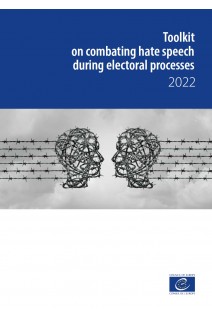FOREWORD PREFACE CHAPTER 1 – HATE SPEECH AND ELECTORAL CAMPAIGNS CHAPTER 2 – HATE SPEECH AND ELECTION MANAGEMENT BODIES CHAPTER 3 – EXPERIENCE OF GEORGIA: HATE SPEECH DURING ELECTORAL PROCESSES APPENDIX – TRAINING MODULE FIGURES
Figure 1: Systematic approach to counter hate speech
Figure 2: Core engine of hate speech
Figure 3: Hate speech pyramid
Figure 4: Definition of hate crime
Figure 5: Hate crimes reported to the police: bias motivation
Figure 6: Hate crimes – By type of crime
Figure 7: 2020 Presidential Elections – Hate speech on Twitter – monitoring results
Figure 8: Hate speech in social media against women during Georgian 2020 elections
TABLES
Table 1: Biased attitudes and acts of bias
Table 2: Hate crime legislation in Germany
Table 3: Hate crime cases recorded by Georgian police
Table 4: Threshold test for hate crimes
Table 5: European Convention on Human Rights: Freedom of expression
Table 6: Hate speech incidents against EMBs – Examples
Table 7: Risk assessment – Hate speech against EMBs
Table 8: Elements of a Code of Conduct for EMBs
Table 9: Training of EMBs on hate speech
Table 10: Analysis of hate speech risks in electoral campaigns
Table 11: ECRI General Policy Recommendation No. 15 on Combating Hate Speech: monitoring hate speech
Table 12: How to recognise hate speech directed against women during election campaigns
Table 13: ECRI General Policy Recommendation No. 15 on Combating Hate Speech: effective action against hate speech
Table 14: ECRI General Policy Recommendation No. 15 on Combating Hate Speech: civic education
Table 15: ECRI General Policy Recommendation No. 15 on Combating Hate Speech: Codes of Conduct and penalties
Table 16: ECRI General Policy Recommendation No. 15 on Combating Hate Speech: regulation of media






